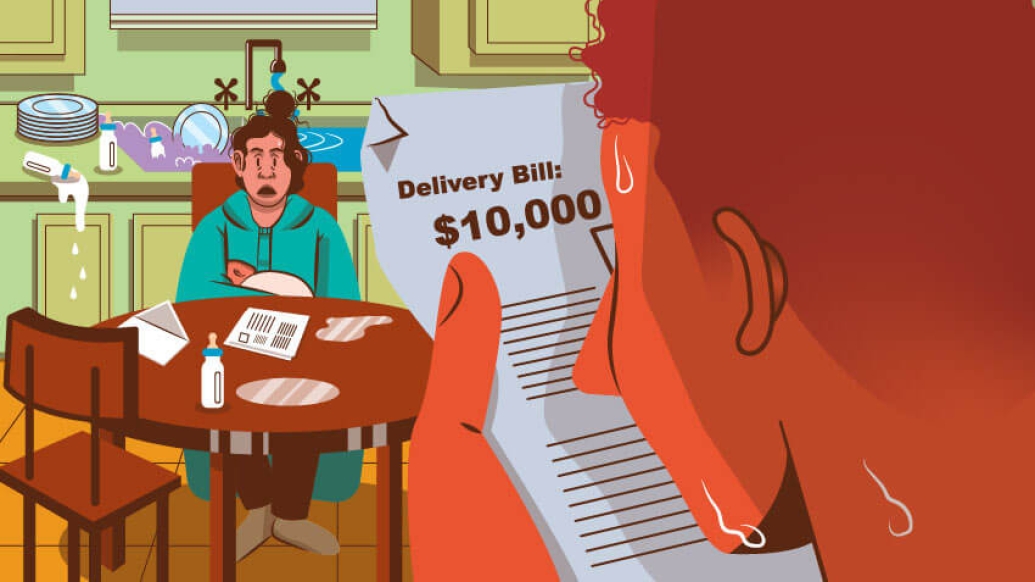Out-of-pocket spending for maternal and newborn hospitalizations among privately insured families can exceed $10,000 if babies require neonatal intensive care.
5:00 AM
Author |

The price tag for giving birth in America may bring some families sticker shock – even for those with private insurance.
And when delivering moms require caesarians or their newborns need neonatal care, some families may spend as much as $10,000 out-of-pocket, according to a new Michigan Medicine-led study.
"Childbirth is the most common reason for hospitalization in the U.S.," said lead author Kao-Ping Chua, M.D., Ph.D.,a pediatrician and researcher at University of Michigan Health C.S. Mott Children's Hospital and the Susan B. Meister Child Health Evaluation and Research Center.
"Our findings show that some privately insured families are shouldering an astoundingly high financial burden for childbirth-related hospitalizations."
During 2016-2019, privately insured families paid an average of $3,000 out-of-pocket for maternal and newborn hospitalizations, according to the research in Pediatrics. But for one in 6 families, out-of-pocket spending exceeded $5,000. And when neonatal intensive care was required, the price climbed to over $10,000 for about 1 in 11 families.
"Many privately insured families believe that if they have health insurance, they're protected from the costs of childbirth hospitalizations. Unfortunately, this is simply not true for many families, particularly if their baby needs NICU care," Chua said.
"Having a healthy baby is expensive enough given the costs of diapers, childcare, and baby equipment. Adding a $10,000 hospital bill on top of this can devastate some families."
MORE FROM THE LAB: Subscribe to our weekly newsletter
Researchers analyzed national data of 12 million privately insured enrollees across all states in the country. They identified 398,410 maternal deliveries that were linked to at least one newborn hospitalization covered by the same family plan. Overall, average out-of-pocket spending for the delivery and newborn hospitalizations was $3,068.
When cesarean birth occurred, the average bill was $3,389. When NICU care was needed, the average bill was $4,969. This bill exceeded $10,000 for 9% of instances when NICU care was needed.
About 30% of the time, deliveries and newborn hospitalizations were covered by high-deductible health plans, such as a health reimbursement arrangement or health savings account. Out-of-pocket costs were primarily driven by deductibles and co-insurance.
Having a healthy baby is expensive enough given the costs of diapers, childcare, and baby equipment. Adding a $10,000 hospital bill on top of this can devastate some families.Kao-Ping Chua, MD
Chua said he was inspired to pursue the study because of his own personal experience that involved a $5,000 out-of-pocket bill after the birth of his second daughter.
"This is an issue that impacts millions of Americans at some stage in their lives," he said.
"Before delivery, clinicians can help privately insured families understand their childbirth benefits. If large bills are expected, clinicians should advise families to save money, assuming they have the means to do so. After delivery, clinicians should screen families for financial hardship, particularly those experiencing resource-intensive hospitalizations, such as NICU care, and connect them with local resources to address food, housing, and financial insecurity."
While substantial cost-sharing may be justified for low-value care, childbirth is a necessary, high value service, says senior author Michelle Moniz, M.D., M.Sc.,an obstetrician gynecologist at University of Michigan Health Von Voigtlander Women's Hospital. Moniz says policies should aim to alleviate the financial burden of childbirth on families.
Ideally, insurers would waive most or all cost-sharing for these hospitalizations, consistent with the approach taken by Medicaid programs and many peer, high-resource countries, she says.
The new study adds to Moniz' previous study examining the out-of-pocket costs of pregnancy, delivery, and postpartum care for mothers. .
"Maternal and childbirth hospitalizations are essential to families' health and wellbeing, with some babies needing longer stays because of complex or unexpected medical conditions," Moniz said.
"These services are vital to ensuring the best possible outcomes for moms and newborns. We should be looking at ways to improve childbirth coverage to avoid sending families home from the hospital with thousands of dollars in debt."
Additional authors include A. Mark Fendrick, M.D., of University of Michigan; and Rena Conti, Ph.D., of Questrom Boston University School of Business.
Paper cited: "Out-of-Pocket Spending for Deliveries and Newborn Hospitalizations Among the Privately Insured," Pediatrics. DOI: 10.1542/peds.2021-050552
Like Podcasts? Add the Michigan Medicine News Break on iTunes or anywhere you listen to podcasts.

Explore a variety of healthcare news & stories by visiting the Health Lab home page for more articles.

Department of Communication at Michigan Medicine
Want top health & research news weekly? Sign up for Health Lab’s newsletters today!





